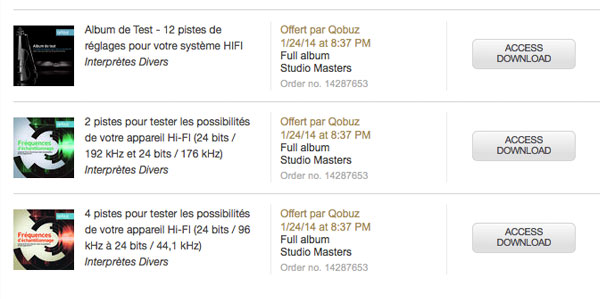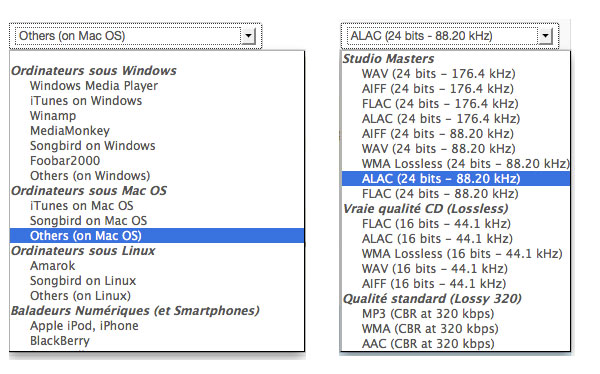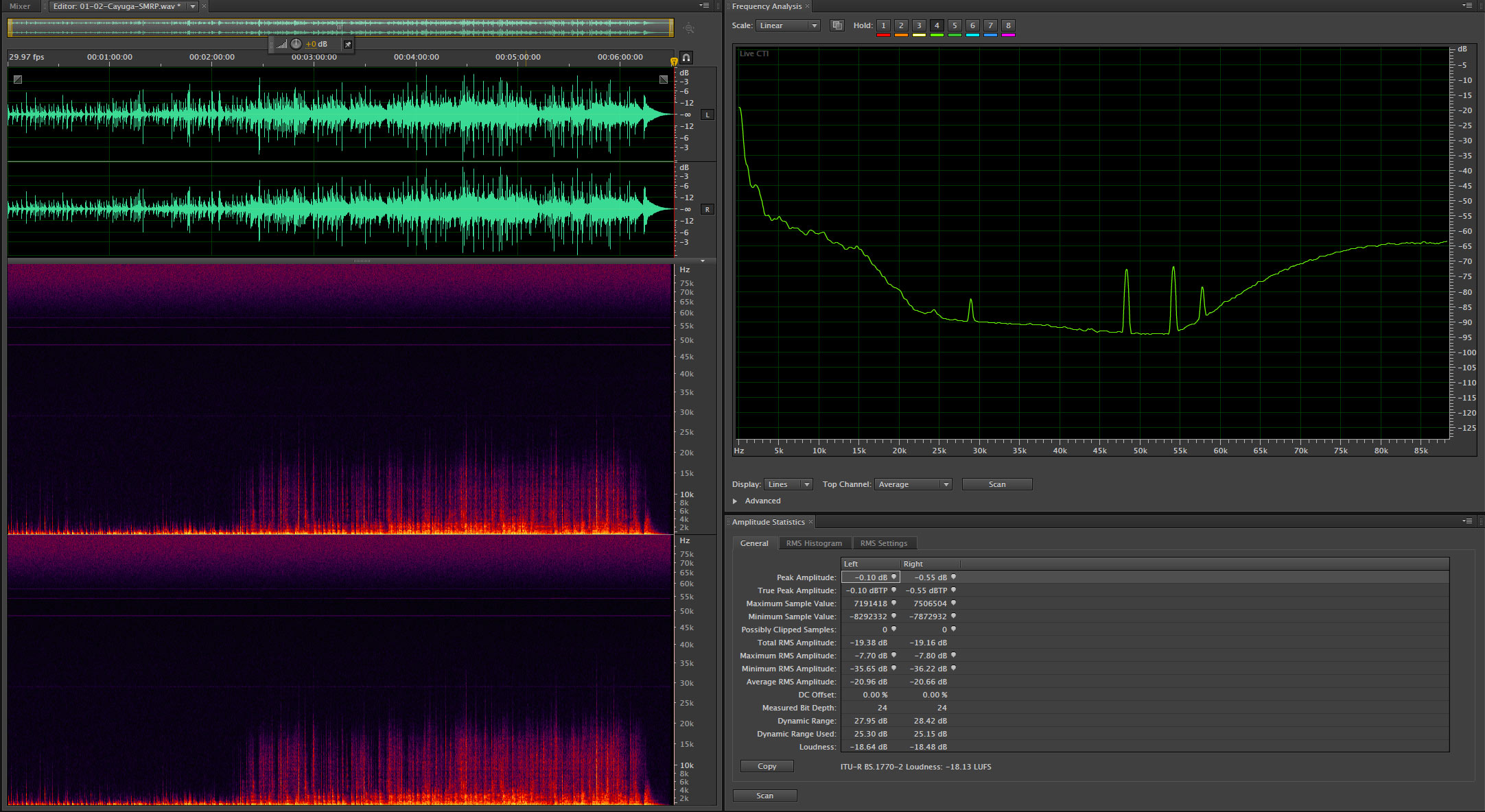Why Pretend?
The emerging awareness of High Resolution Audio and its commercialization are headed for rough waters if the providers of “so-called” high-res audio downloads don’t start coming clean about what they’re offering. I’m seriously worried that the continued confusion regarding what is and what isn’t a high-resolution audio track will result in the death of what could be a revolutionary move away from the same old thing. Why am I bringing this up again? Because I joined and downloaded the sample high-resolution audio files from the French site QoBuz.com…and found more of the same hype and inaccuracies that have dominated most domestic sites.
QoBuz.com seems to be a big player in the E.U. Their site is extensive, offers content from the major labels, has “high-resolution streaming”, a high-end audio magazine and lots of user choices for each track. They will sell you a low resolution MP3 file up to “Studio Quality Masters” at 192 kHz/24-bits! You identify your OS and they recommend which format you should download. The choices are quite extensive as you can see from the list below:
Figure 1 – The pull down menus on QoBuz.com showing the various OS, music player and format options available from their site.
I signed up and established an account yesterday. My Downloads folder was populated with a few promotional tracks, so I downloaded the tracks that are described as “2 pistes pour tester les possibilités de votre appareil Hi-FI (24 bits / 192 kHz et 24 bits / 176 kHz) Interprètes Divers”. In English, they’re saying that I can download 2 tracks that will show the possibilities of my equipment…that their files are 24-bits/192 kHz or 24-bits at 176 (really 176.4 kHz). I downloaded their Downloader (which is very nice and seems solid) and then proceeded to download the two “high-resolution audio” tracks to evaluate “different sampling frequencies”.
If you were running a high-resolution audio download site, wouldn’t you want the first experience…the one that you provide free…to be of the highest quality and unimpeachable with regard to fidelity and specifications? I can’t imagine what the people at QoBuz.com are thinking when they give everyone who signs up for an account two files that are so obviously not high-resolution!
Here’s the spectragram of the first file. The title of the piece is “Mere de Dieu Vierge” and it is a performance by an a cappella vocal ensemble. Human voices don’t put out a large amount of high frequency sound so I wasn’t expecting too much with this track. What I discovered was a track that had been rolled off at 23 kHz! This was advertised as a 192 kHz/24-bit track and is intended to used to evaluate very high sampling rate material. Take a look:
Figure 2 – A spectragram of a “192 kHz/24-bit” demonstration file from QoBuz.com [Click to enlarge].
The fact that this plot goes to absolute zero means that they used a low pass filter to exclude any frequencies that might have been in the recording space beyond standard CD resolution. I just can’t figure it.
The second track was recorded at 176.4 kHz. It’s a jazz trio featuring an acoustic bass. We would expect it to contain a reasonable amount of high frequency material due to the drum set. This time there’s no roll off…although the track would probably benefit from a LPF because there’s a few oscillations in the upper spectra and a large amount of noise in the highest frequencies. My guess is that this track was recorded using analog tape and that there was some ultrasonic noise present in the studio. Here’s the spectragram.
Figure 3 – A spectragram of a “176.4 kHz/24-bit” demonstration file from QoBuz.com [Click to enlarge].
It’s pretty clear that the French site has some misunderstandings regarding high-resolution audio. Unfortunately, the amount of misinformation being put forth about high-resolution audio is pushing what could be a promising new development closer to the cliff. I’m discouraged.
The new iTrax is in progress. I’m going to include spectragrams on all albums and try to be clear about the provenance…we’ll see if it makes a difference.





This is exactly the sort of issue I have been raising in my comments earlier in your blog. We consumers are getting quite discouraged by the obvious evidence that we are being taken for a ride. I am pleased to see you raising it with similar sentiments in your blog, Mark. Two solutions I like are [1] all releases describe the lowest resolution used in the production stream (including a sane assumption* for analog ‘resolution’ depending on the analog process), or [2] don’t offer a download at a resolution higher than the lowest resolution used in the production process (including a sane assumption* for analog ‘resolution’ depending on the analog process). Personally I like the second option better, as it is more clear and obvious to the consumer.
* by ‘sane assumption’, I mean it is OK if, say, Mobile Fidelity use their Ultra Analog methods to get music signal at 100 kHz and noise levels at -110 dB, to offer a download at 18/192 resolution if they have checked the final file to see these performance levels have been achieved. But OTOH if some old Sara Vaughan tapes that only reach to 20 kHz and noise at -70 dB are being offered for download, the downloads offered should not exceed 12/48 resolution.
Mark, you are not going to like reading my next comment, but I think you need to make this a higher priority and attack it with more urgency. You can rightly counter that you are limited in your influence, but maybe band together with other producers who agree, come up with a clear solution to press for (not just a complaint), start a website for the cause like the Loudness War site, with a catchy name like Downloading Truth and Honesty, which publishes a Shame List for every download known to be misleading and where it is happening. Call David Chesky (HD Tracks) and have an honest conversation with him abut how the current practice could bring down your business and much of the industry, and what you are going to do about it, and being so dedicated as the Chesky label has been to high production standards, surely he would like to see this practice cleaned up and see HD Tracks proudly state it complies with the Downloading Truth and Honesty standards? Maybe get yourself interviewed by Stereophile about the crusade, putting it fair and square in the minds of a vast audience of audiophiles? These are just a few ideas, but this issue can’t just ‘die’ now that you have mentioned it in a blog post.
cheers
Grant
Grant, thanks for your comprehensive response. As you can tell, I have been a very vocal advocate for provenance, accurate marketing and meaningful definitions for high-resolution audio. I’m working everyday through these posts AND behind the scenes with NARAS, the CEA and AES to advance a sensible approach to this issue. Getting agreement or even getting the attention of these groups is very challenging. No one is prepared to rock the boat.
I’ve known David Chesky and his brother for a long time AND I have discussed exactly the things that you bring up in your comment. Nothing is going to change HDtracks policies, nothing is likely to alter the direction things are going until the artists, producers and record labels see an economic advantage in being honest about the levels of fidelity that they produce and sell.
This site is a step in the right direction. Information is key. The new iTrax.com will be launch within the next couple of months and I hope will become a reference site…in terms of information and available downloads. We’ll see.
I finished reading the Steve Jobs book this morning. It was gift from one of my sons and I thoroughly enjoyed it. My take away is that innovative companies need to make available products that consumers don’t even know they want yet. Doing market surveys about products that no one has experienced is a waste of time. Not until they experience an iPad will they know just how much it can offer. The same is with high-resolution audio in surround made with the idea of maximizing fidelity and the emotional experience. Music lovers don’t know that they will love it because they’ve never experienced it.
Thanks Mark, that’s a very reassuring reply. I withdraw my comment that you should do more! 🙂
But still, the Loudness War site gets a lot of exposure across the audiophile internet sites, even mentioned IIRC in some Stereophile columnist articles, so having something like that for Truth and Honesty In Downloading might take off and make a difference of the sort that you wrote that Chesky needs to see before he will change HD Tracks policies.
Good luck with the upcoming new iTrax site, I wish you well. Make a big bold statement on the front page that this is the ONLY audio download site that promises that all downloads have a Minimum Recording Chain Resolution no less than the download resolution.
regards
Grant
It is depressing that in politics as well as industry there are those who simply cannot advance themselves or ideas honestly. Such, apparently, is the status of the recording industry heavy-weights. But no one is trying to eliminate them or their methods. What needs to be advocated is simply a truth-in-labeling policy, perhaps like the old 3-letter code on CDs: ADD, DDD, etc. showing how each production stage was processed. This would give the consumer the information to make an informed purchasing decision. But, isn’t there a possibility that only a few downloaders care? Aren’t we talking about the generation raised on MP3 with no complaints? What with the dumbing down of America where are technically literate listeners going to come from?
I think the answer may be in some company packaging a receiver/speaker/internet combo machine which will download and play only Real-HD files or play Real-HD disks. This will remove the many decisions which confront a high-end user.
In the meantime, I’ve changed the sig on my emails to reference this HD-Audio site. Who knows?
You received 2 answers:
http://www.qobuz.com/info/Hi-Fi/Les-cingles-de-la-Hi-Fi/Les-Cingles-de-la-Hi-Fi174876
Have fun 🙂
ps: I’m a pure newbie in audio but I like to read about it
I read the post and many of the comments. It’s encouraging that people are reading my stuff…but troubling that they lifted the entire post. See my post today for a response.
Hi Mark Waldrep
Your article is very much bad faith.
It happens that we do have a direct relationship with a large number of the labels or producers we are dealing with – not only being provided by obscure agregators. In this case a very direct relationship – bad luck.
And the two producers you are pointing in your post answered your objections on Qobuz yesterday with some details :
http://www.qobuz.com/info/Hi-Fi/Les-cingles-de-la-Hi-Fi/Les-Cingles-de-la-Hi-Fi174876
Nedless to say, I am affraid.
Best
My post was not authored in bad faith. I simply evaluated two tracks that you claimed were high-resolution only to find that they failed to be as advertised. I did not say that they were bad recordings or unpleasant…only that they do not contain the kind of information that would qualify them as high-resolution tracks.
Since you decided not to include your name with your comment, I will simply address you as a representative of QoBuz. I read with interest the responses from the producers of the records that you offer as FREE examples of high-resolution audio. I was forced to use the translate function but I think I go the gist of the comments. I will certainly respond with a full blog post as I believe that their positions lack some essential pieces of information.
BTW I would very much prefer that you and your members not “borrow” or quote an entire post from my site. Certainly a line or two or even a paragraph is acceptable but you’ve effectively taken lifted my entire post. I don’t believe you would favor a web site re-posting entire articles from your magazines. If you or your readers are interested in my posts and posting comments then they should do so here. Please rectify this situation immediately.
Dear Qobuz,
I am very sorry but having read Mark’s posts and your own I must support Mark’s position.
I am a professional electronics and software engineer with 30 years’ experience in high technology, including 3 years working in Paris at the HQ of Alcatel as a young engineer in the 80’s.
I have owned and run my own company now for many years and to be honest I simply cannot understand your position given that the primary selling proposition of your business centres on the provable higher quality of the music format being sold.
Your position seems centred more on arrogance and ignorance if I am direct and honest.
Mark’s statements are clearly factually correct and fully supported by the science and engineering of the data that he has published.
Your comment that he is operating in bad faith is baffling.
You have not even provided the courtesy of posting in your name choosing instead anonymity … a clear indicator to my mind in where the bad faith lies.
It would appear from the Qobuz responses that you are not approaching the issue from a position of scientific and engineering knowledge. Not a good starting point for a business that is inherently technical, like it or not.
Also please keep in mind that when responding with a large post on your website in French, to a post made in English this far from helpful. For myself having lived in France this is not an issue. But again out of courtesy you should respond in English (and if applying more common sense and business acumen due simply to the fact that most of your customers will not be French speakers, unless you want to severely limit your commercial success, you should post in English).
Regards,
John Palmer
well having read through this website implying basically the german highresaudio.de and french qobuz are so called hd audio providers (europeans are known as cheaters, right?) while HD tracks in the Us is the real treat well I think it doesnt matter in which language response is given… considering the overwhelming success they have in the Uk and other countries their language seems universal… maybe you should take French lessons so you could share your extremely educated positions there on qobuz ? oh and do not forget highresaudio.de in German.
Europeans are know as cheaters…I don’t agree with that. It seems to me that we have plenty of that in this country too. HighResAudio and Qobuz AND HDTracks offer many of the same major label content. These are new transfers of older recordings. I have faulted all of them for misrepresenting what they sell. I know enough French and German to be able to read their sites and comments.
Hi Mark,
Can I ask what software did you use to evaluate the tracks?
I use Adobe Audition to create the spectrograms and do the evaluation.
Man i would love to hear some Real high-resolution audio .. This whole thing with DSD and HDtracks and for crying out loud, why does this have to be such a mystery.. i just want some digital playback that doesn’t sound so harsh like 16/44.1
Bought some Mozartz Requiem Naxos 2x HD audio 24/192khz, that sounded like the real deal. when played back through 24/192 the tape hiss sounded more high frequent, than when listening to it in 24/96khz
maybe it’s time i also started using some spectograms and started informing myself about this, seems like i have been ripped off by this shameful industry! Shame on you Industry !
If you’re listening to standard CD spec PCM digital and finding it sounds harsh…something is wrong with your playback setup or you’re playing poor recordings. The Naxos 2xHD audio products are a fraud…these are transfers of older recordings done using analog gear. That’s not real high-res music.
You need to read more of this column’s posts and maybe purchase my book.